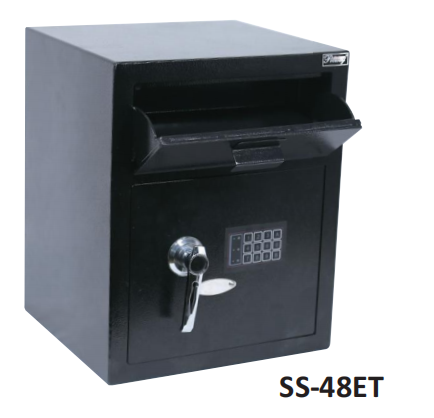Better Touch Better Business
Contact Sales at Proway safe suppliers.
A "deposit safe" typically refers to a secure storage box designed specifically for safeguarding valuable items, documents, or cash. This type of safe is commonly used in commercial and financial institutions, as well as for personal use when there is a need for secure storage of important items. The design of these safes prioritizes security, aiming to prevent unauthorized access and theft. Deposit safes often feature a sturdy metal exterior and employ advanced locking technologies such as digital keypad locks, biometric recognition, or traditional mechanical locks. These safes can be wall-mounted, floor-fixed, or designed as larger secure vaults to accommodate different security requirements. In commercial and financial settings, deposit safes are commonly used to securely store large amounts of cash, precious metals, crucial documents, and other valuable items. Individual users may also utilize small deposit safes at home to protect personal belongings, jewelry, documents, and more.

The application areas of "deposit safe" are quite diverse, spanning across business, finance, and personal life.
Here are the main application domains for deposit safes:
1. Financial Institutions: Banks and other financial institutions use deposit safes to protect large amounts of cash, precious metals, and important documents. These safes are typically designed to be highly robust to prevent potential theft and unauthorized access.
2. Residential Use: In a residential setting, individuals may purchase small deposit safes to securely store jewelry, important documents, medications, or other valuable items, providing a means to protect personal property at home.
3. Office Spaces: Companies and enterprises in office settings use deposit safes to securely store important documents, contracts, data backups, and possibly emergency funds.
4. Jewelry Stores and Art Galleries: In places where the protection of jewelry, art, or other expensive items is necessary, such as jewelry stores or art galleries, deposit safes are also common security devices.
5. Commercial and retail: Commercial establishments such as retail stores, convenience stores, etc. often use deposit safes to safely store cash. This helps reduce the risk of losing cash, especially during peak trading times or when frequent checkouts are required.
6.Hotel Front Desks:Hotel front desks often handle significant cash transactions, including guest deposits and room payments. A deposit safe provides a secure way for front desk staff to quickly and conveniently deposit cash, reducing the risk associated with carrying large amounts of cash.
Deposit safes have some notable features that make them ideal for safe storage.
The following is a common deposit safe feature:
Deposit safes are often equipped with anti-phishing devices, which are designed to prevent criminals from using various phishing techniques to access items stored inside the safe. There are several common types of anti-phishing devices:
1. Anti-phishing claws: This device is designed to prevent any object from entering and attempting to "hook" items stored inside the safe after the door is closed. The anti-phishing claws are typically made of special structures or materials that prevent hooks from successfully entering the safe.
2. Anti-phishing grooves: Some deposit safes have special grooves designed around the door gap to prevent any attempts at phishing. These grooves make it more difficult to use tools or devices to try to grab items inside.
3. Special door designs: Some deposit safes use special door designs, such as inclined or concave-convex shapes, making it difficult for objects to be easily inserted or grabbed after the door is closed. This design increases the difficulty of preventing phishing.
Deposit safes come in various styles of locks, each with its unique features and advantages.
Here are some common styles of locks for deposit safes:
1. Digital Keypad Lock: This is a common type of lock where users need to input a pre-set numeric code to open the safe. Digital keypad locks offer a relatively convenient user experience, and the password can be easily changed, enhancing security.
2. Mechanical Combination Lock: A mechanical combination lock requires users to rotate the dial on the lock wheel and follow a specific combination to open the safe. This type of lock has no electronic components, making it immune to power failures, but it may be more susceptible to physical attacks.
3. Key Lock: The key lock is one of the most traditional types, where users need to use the corresponding key to unlock the safe. The simplicity and reliability of this lock are advantages, but it requires careful key management to prevent loss.
4. Dual Lock System: Some deposit safes combine the advantages of multiple locks, such as a combination of a digital keypad lock and a mechanical combination lock. This design provides multiple layers of security and increases the difficulty of opening the safe.
Proway is a company that offers a range of security products, and one of their notable products is the deposit safe designed for shops, hotel information desks, and offices.
Here's an introduction to the key features of this specific product:
1) Deposit safe for shops, hotel infromation desk and office
2) 3-8 digitals LED indicator
3) 3 incorrect entries auto-locking function
4) Pre-drilled anchor holes provided
5) Color: White, Black, Gray
6 ) External Size (W x D x H) 390x350x480mm
7) 2 Override Keys
Proway's deposit safe is not only designed with security in mind but also takes into consideration user convenience and the diverse aesthetic preferences of different settings. The inclusion of features like LED indicators, auto-locking functions, and anchor holes demonstrates a commitment to providing a comprehensive and reliable security solution.
Copyright © 2021 Proway Industries co ltd. | All Rights Reserved